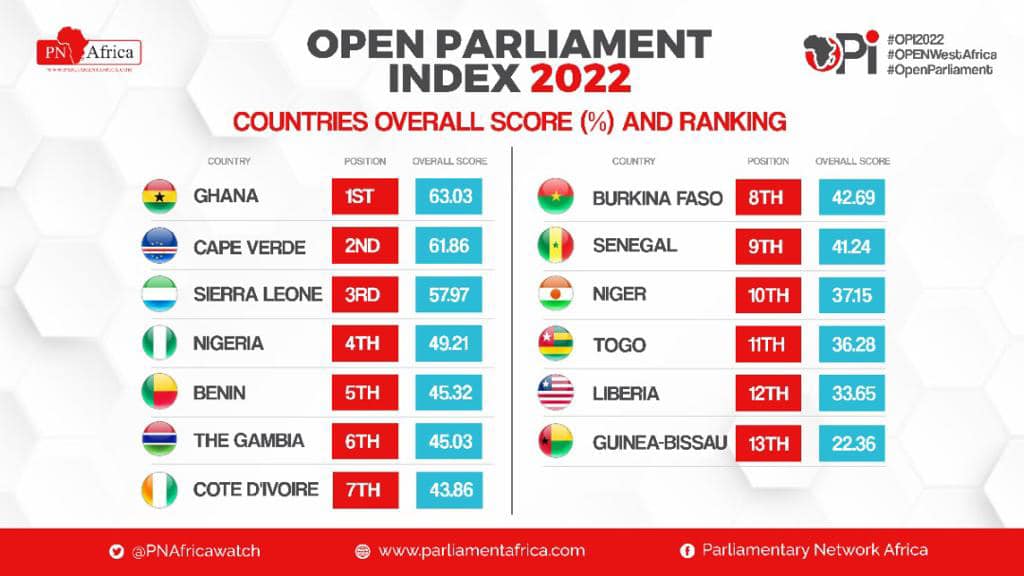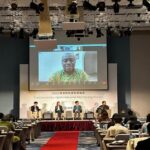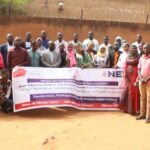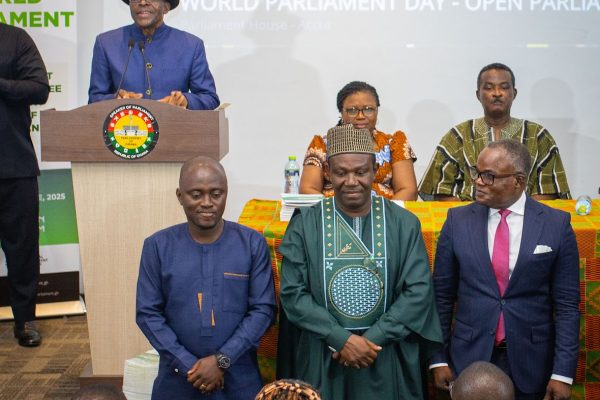The Open Parliament Index (OPI) is a legislative transparency tool developed to assess the level of openness – transparency, accountability, and citizen inclusion – in African parliaments. In 2022, the maiden edition of the OPI was published, measuring 13 national parliaments in West Africa.
What are the objectives of the OPI?
There are three main objectives the OPI seeks to achieve:
ü To strengthen parliamentary institutions towards the advancement of parliamentary openness across national and regional parliaments;
ü To foster collaboration between civil society and parliaments towards achieving the principles of open parliament, and provide a platform for amplifying open parliament initiatives; and
ü To identify, compare and exchange knowledge and best practices among national parliaments, and among civil society organizations that work with parliaments
OPI Change Stories
Since the publication of the OPI report in 2022, these have been some of the success stories that have been achieved through our Country PEMO Networks.
ü The President of the Benin National Assembly established an independent parliamentary committee to work with the Benin PEMO Network to develop open parliament action plans and reforms in response to their performance gaps in the OPI 2022 report.
ü The OPI report also prompted the launch of a citizens’ radio program by the parliamentary radio station of the Benin National Assembly to educate citizens on the work of parliamentarians and to promote public participation in parliamentary processes.
ü In Ghana, the OPI findings inspired the Parliament of Ghana to establish a “Citizens Bureau” to bridge the gap between representatives and the represented and facilitate civil society engagement with parliament.
ü The Ghana PEMO Network leveraged the expertise of its members to support the Parliament of Ghana to co-create a 4-year Open Parliament Action Plan which has been approved by the Parliament for implementation beginning 2024.
ü The Parliament of Sierra Leone established the Parliament-CSO Network, a joint network of Parliament and CSOs/PEMOs who have signed a memorandum of understanding to implement joint initiatives towards strengthening parliament and the relationship it has with the citizens.
ü In Niger, even before the military coup, the PEMO Network engaged parliamentarians on the OPI findings and established a joint committee of MPs and CSOs to co-create reforms and actions to enhance parliament’s openness to the citizens.
ü In Cote d’Ivoire, the country network of PEMOs engaged National Assembly Members in workshops to enhance their understanding of parliamentary openness and to foster working relations that allow for continuous engagement and provision of support to parliamentarians and Committees of the National Assembly.
Call to Action: Mobilizing PMOs within Africa
Africa PMOs Network provides an opportunity and platform for civil society to evaluate their operations and draw strategies to address the common challenges they identify in the future. Whether at the national or regional level, parliaments play a crucial role in promoting regional integration. And it is the more reason we need to commit to promoting transparent, accountable and inclusive parliaments across the sub-region. One may ask, what role does parliament play in what we are doing or saying here? Among the roles parliament plays is to take legislative action by reviewing and ratifying legislation relevant to open government; ensuring parliamentary oversight and holding government accountable.
APMON continues to successfully facilitate initiatives that bridge the gap between parliament and citizens, enhance citizens’ access to parliamentary information, contribute to increased transparency in parliaments, and boost engagement between representatives and the represented.
In 2024 and beyond, APMON will work closely with PMOs within Africa to support mobilizing national chapters of the network across the five sub-regions and support our partner organizations to structure and ensure the effective functioning of the regional blocs towards achieving an Open Parliament in Africa. As we look forward to conducting the Africa Open Parliament Index 2024, we look forward to building strong collaborations between CSOs working with parliament to actively participate in the survey to serve as a benchmark for parliaments in the sub-region towards transparency, accountability and inclusivity.
In conclusion
APMON is not merely a network of organizations; it is a movement dedicated to reshaping the narrative of parliamentary governance in Africa. We look forward to forging partnerships, building synergies, and collectively contributing to a brighter, more democratic future for the African continent.





